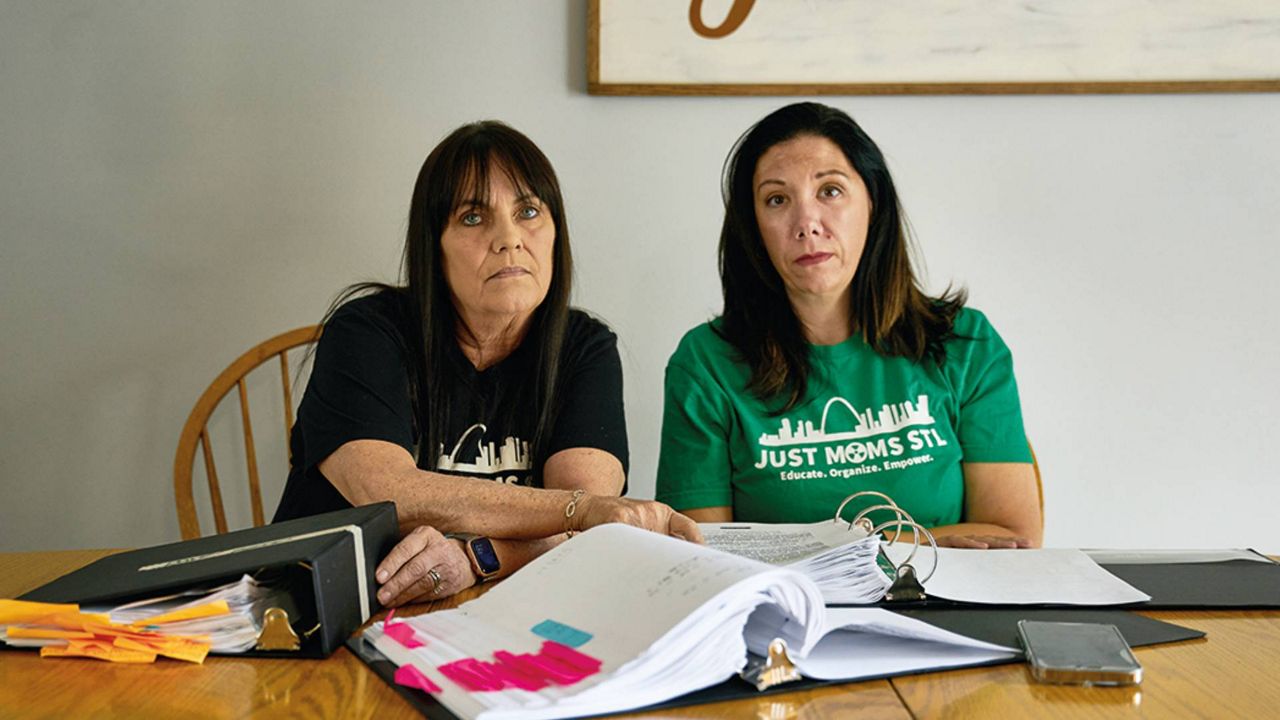Over the course of half a dozen trips to Washington, D.C., Dawn Chapman has become accustomed to long days of congressional meetings and questions about St. Louis’ decades-long struggle with radioactive contamination.
Chapman, co-founder of Just Moms STL, wraps her feet with duct tape to keep her shoes from giving her blisters, and she and fellow advocates pack their schedules with meetings to ask lawmakers to expand compensation for those exposed to the U.S. nuclear weapons program.
The months-long fight has drained the budget of the small nonprofit, founded about 10 years ago to advocate for communities exposed to nuclear waste in the St. Louis region.
Despite efforts by St. Louis activists, as well as communities across the southwest, Congress has yet to act. And with the federal government’s existing compensation program set to expire in two weeks, the decision has come down to the wire.
“I definitely think we are on the winning side of this,” Chapman said in an interview with The Independent, “and I do feel hopeful. It’s just — I’m tired.”
Chapman and fellow advocates are asking Congress to expand the Radiation Exposure Compensation Act, originally passed in 1990 to compensate uranium miners and those who were exposed to atomic bomb testing in parts of Nevada, Utah and Arizona.
But it excluded parts of the southwest, including New Mexico, where residents have developed cancer or had children with birth defects because of exposure to World War II-era bomb testing.
It also didn’t include St. Louis communities that have struggled for decades with lingering contamination left over from efforts to develop the first atomic bomb.
The existing RECA program’s June 10 expiration date has set up a standoff between lawmakers from states already covered by the program and states, like Missouri, hoping to be included. But Chapman said she and fellow St. Louis-area activists will keep pushing even if the program isn’t expanded in the next two weeks.
“The reasons for RECA, the people that need it — they don’t disappear after June (10) regardless of what happens with this program,” she said.
Parts of St. Louis have been contaminated for 75 years with radioactive waste left over from the effort to build the world’s first atomic bomb. Uranium refined in downtown St. Louis was used in the first sustained nuclear chain reaction in Chicago, a breakthrough in the Manhattan Project, the name given to the effort to develop the bomb.
After World War II ended, uranium was trucked from St. Louis to surrounding counties and dumped near Coldwater Creek and in a quarry in Weldon Spring, polluting surface and groundwater. Remaining waste was dumped at the West Lake Landfill in Bridgeton, where it remains today.
Generations of St. Louis-area families lived in homes near contaminated sites without warning from the federal government. A study by the federal Agency for Toxic Substances and Disease Registry found exposure to the creek elevated residents’ risk of cancer. Residents of nearby communities suffer higher-than-normal rates of breast, colon, prostate, kidney and bladder cancers and leukemia. Childhood brain and nervous system cancer are also higher.
An investigation by The Missouri Independent, MuckRock and The Associated Press revealed last summer that the government and companies that handled the waste knew of the dangerous contamination for years before they informed the public. Those revelations inspired a push by U.S. Sen. Josh Hawley to expand RECA to cover those exposed to waste in St. Louis.
Hawley’s legislation, which passed the Senate again in March, would expand RECA to remaining parts of Arizona, Nevada and Utah as well as to Colorado, Idaho, Montana, New Mexico and Guam, where residents were exposed to radiation from nuclear bomb testing. It would also expand coverage to those exposed to radioactive waste in Missouri, Tennessee, Alaska and Kentucky.
The expansion of RECA sponsored by Hawley, a Missouri Republican, has twice passed the Senate. But it’s been stuck for months in the U.S. House of Representatives.
Members of the Missouri Congressional delegation hoped it would be included in a federal appropriations bill in March and were outraged when it wasn’t included. U.S. Rep. Cori Bush, a Democrat from St. Louis, called its exclusion an “insult to our communities.”
Since then, Bush has joined advocates in a last push to get RECA expanded before it expires next month.
Bush has written letters to each of her 434 House colleagues, calling on them to support expanding RECA, and organized a meeting between advocates and House Minority Leader Hakeem Jeffries, a Democrat from New York.
Bush said it had been frustrating that the legislation hasn’t made it through the House because “this legislation is a no-brainer.”
“We’re talking about compensating people at home who have been victims of war and continue to be victims of World War II,” she said. “The reality is that the people in St. Louis as well as across the country have been poisoned by the federal government, and the government has a responsibility to compensate those victims no matter the price tag.”
Bush said she needed colleagues to listen to victims.
“The cost has already been paid,” she said. “The cost is the human lives that have been taken because of our government’s negligence, the cost is those who are here on the Hill over and over again that are bringing stories forward saying, ‘My kids, my grandkids, me, my parents have all been sick or died.’”
On the other side of the aisle, U.S. Rep. Ann Wagner, a Republican from the St. Louis suburbs, snagged a surprise meeting for advocates earlier this month with staff of House Speaker Mike Johnson’s office.
Wagner’s office declined an interview but said she will “continue to fight for reauthorization and expansion of RECA.”
Chapman said staff from Johnson’s office didn’t promise to bring RECA to the floor. But, she said, “what they told us is that it is absolutely on their radar.”
“They’re not ignoring it,” Chapman said. “They know it’s there. They are aware of it now and that there is a tremendous amount of Republican colleagues that are writing letters and that are reaching out to their office to have this hit the floor.”
For more from our partner, click here to subscribe.









